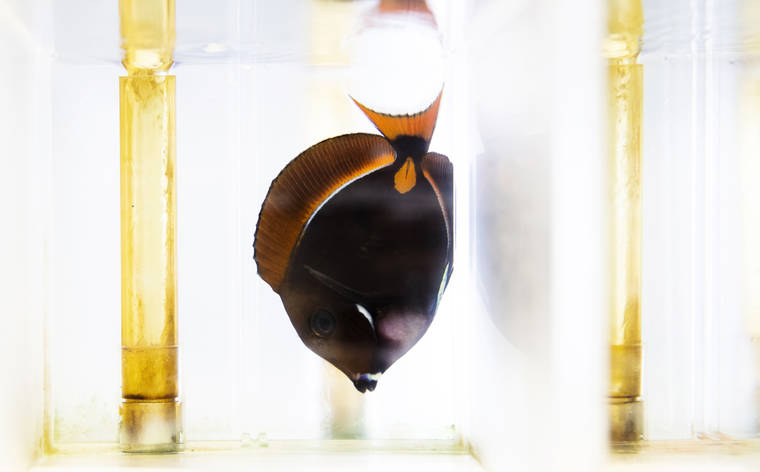BLNR votes 7-0 against environmental impact statement for aquarium fishing permits in West Hawaii

CINDY ELLEN RUSSELL / CRUSSELL@STARADVERTISER.COM
Achilles Tang
In a sweeping 7-0 decision, the Board of Land and Natural Resources voted against a group of aquarium fishers seeking permits to collect aquarium fish in West Hawaii.
After four hours of deliberation Friday, the BLNR decided that a recently submitted, 2000-page Final Environmental Impact Statement the fishers submitted did not adequately address the potential environmental impacts that could come from issuing the permits.
The fishers, part of the Pet Industry Joint Advisory Council, asked the Department of Land and Natural Resources for 10 of such permits for Hawaii island’s West Hawaii Regional Fisher Management Area, which they said was the site of nearly $1.3 million of the state’s commercial aquarium fishery in 2017. At that point 45% of the aquarium fish caught in Hawaii came from the management area.
In 2017, the Hawaii Supreme Court ruled that existing permits allowing fishers use fine mesh nets to catch wildlife was illegal, and the DLNR has not issued any since. Fishers who use other gear to catch fish continue to do so, the DLNR said in a news release today.
In the FEIS the council submitted, it said, “There would be no construction of permanent or semipermanent infrastructure, no discharges into coastal, surface or ground waters, no dredging, and no significant use of hazardous materials that could be released into the environment” if the permits were issued.
It also said the permits would not lead to an adverse effect on water quality, soil, vegetation or wildlife.
Don't miss out on what's happening!
Stay in touch with breaking news, as it happens, conveniently in your email inbox. It's FREE!
Despite PIJAC’s assurances, BLNR Chair Suzanne Case said in a statement, “The unanimous vote clearly reflects the Board’s view that the aquarium fishers’ proposal, without meaningful limits on future catch, without enough attention to our highly depleted stocks like pakuʻikuʻi (Achilles tang) and other low-number species, and without adequate analysis of the near-future effects of climate change, ocean warming and coral bleaching on our reefs, did not adequately disclose the potential environmental impacts of the proposed ten permits.”
The council had asked for a daily bag limit of five Achilles Tang, a drop from the daily bag limit of 10 set in 2013.
In report to the state Legislature Opens in a new tab in December, the DLNR reported a significant decline in the Achilles Tang population in West Hawaii from 2008-2018.
PIJAC said the 5-fish bag limit would be well within the range of sustainable fishing for the species, which is targeted for commercial and subsistence purposes.
The DLNR reported hundreds of public testimonies in response to the FEIS. The testimonies were largely against it and the issuance of the permits. Their concerns covered depleted coral reefs and fish populations, which they say the permits would contribute to. Cultural practitioners also opposed the permits and said the culture impacts should be analyzed more.
State Rep. Tina Wildberger (D, South Maui) was among those against the permits, and said in her testimony that “this unabashed commercialism is destroying our reefs, our ocean, and our marine wildlife. … Allowing the aquarium trade to profit so highly with so little oversight is an enormous corporate giveaway of a public trust resource.”
In support of the fishing permits, Ron Tubbs argued in his testimony that there is a demand for aquarium fish as the pet industry has boomed during the COVID-19 Opens in a new tabpandemic Opens in a new tab. He said Hawaii can benefit from the “stable, valuable industry.”
“It is not just catch value, but the global revenue to airlines, local dive shops, tourist aquariums … aquariums worldwide, many jobs, gas suppliers, etc. that all benefit from the aquarium fishery,” Tubbs said.
He said the state’s aquarium fishery has already shown that it is sustainable.



